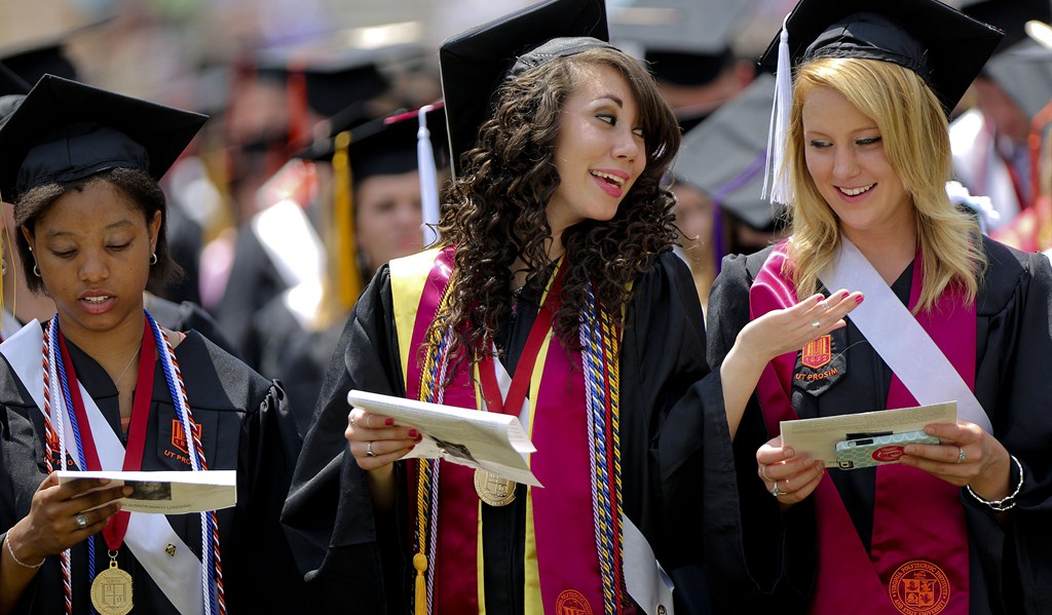A new study shows that roughly 33% of millennials wish they never went to college.
That’s a stunning statistic -- and it’s evidently not because of the keg parties either. Plainly put, since more than 50 percent of college students finance their educations with student loans -- graduating, on average, about $28,000 in the proverbial hole -- it’s easy to see why a plurality of young people wish, in retrospect, they had never attended college in the first place
Here’s an indication of how burdensome student loans have become: About one-third of millennials say they would have been better off working, instead of going to college and paying tuition.
That’s a according to a new Wells Fargo study which surveyed 1,414 millennials between the ages of 22 and 32. More than half of them financed their education through student loans, and many say the if they had $10,000 the “first thing” they’d do is pay down their student loan or credit card debt.
That’s no surprise when you consider student borrowing topped the $100 billion threshold for the first time in 2010, and total outstanding loans exceeded $1 trillion for the first time in 2011. Student loan debt now exceeds credit card debt in the U.S. which stands at about $798 billion.
Delinquencies are also on the rise. The number of borrowers who are at least 90 days late on student loan payments has jumped from 8.5% in 2011 to 11.7% today, according to a study by the New York Federal Reserve.
More troubling is the number of students who take out student loans, and subsequently drop out and never graduate. According to the Washington Post, more than 50 percent of students who take out student loans in order to enroll at “four year for-profit schools” never actually finish their studies. Personally, I can’t even imagine having to pay back these expensive loans -- perhaps totaling tens of thousands of dollars -- without earning a degree. The very idea is deeply unsettling. And yet because student loans are easily obtainable, and young people (like myself) give zero thought to the fact that one day they will eventually have to be repaid, I understand why so many millennials will, later in life, come to regret their borrowing decisions.
Recommended
On the other hand, while it’s certainly true that some of the most successful innovators and entrepreneurs never graduated from college -- Steve Jobs and Bill Gates are two famous names that come to mind -- it’s also true on average that those who do graduate from college earn more money over the course of their working lifetime than those who do not. Perhaps the key, then, is finding the right degree -- at the right price -- for what one eventually wants to do with one’s life.
For example, if someone wants to work professionally as, say, a social worker -- a worthy vocation that most reasonable people would agree can offer great personal satisfaction but is not expected to pay the big bucks -- why would such a student choose a $50,000 per year undergraduate institution when the same degree can be obtained more affordably from a state school? This type of cost/benefit analysis and the resulting financial tradeoffs are often much clearer to the recent college graduate.
College certainly isn’t for everyone, of course. But those who do want to continue their formal education should, at the very least, know the consequences of the available alternatives. If public schools could offer more effective counseling with respect to their options, matriculating seniors would probably be thinking far more critically about these important life-changing decisions.
Otherwise, college bound students may continue to take on financial obligations which -- at the end of the term -- they might never be able to repay.
Correction: A previous version of this article stated that Steve Jobs and Bill Gates never went to college. That's not true. They did but never graduated.
Correction: The author mistakenly identified Sallie Mae as an irresponsible subprime student loan provider, and so the name has been removed. The piece has since been updated.























Join the conversation as a VIP Member